
|
Astronomy Picture Of the Day (APOD)
 Iridescent clouds
Iridescent clouds
10.03.2003
Why would clouds appear to be different colors? A relatively rare phenomenon known as iridescent clouds can show unusual colors vividly or a whole spectrum of colors simultaneously. These clouds are formed of small water droplets of nearly uniform size.
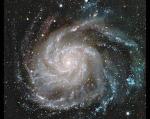 M101: The Pinwheel Galaxy
M101: The Pinwheel Galaxy
9.03.2003
Why do many galaxies appear as spirals? A striking example is M101, shown above, whose relatively close distance of about 22 million light years allow it to be studied in some detail. Recent evidence...
 Farewell Jupiter
Farewell Jupiter
8.03.2003
Next stop: Saturn. The Cassini spacecraft, launched from Earth in 1997, has now swung past Jupiter and should arrive at Saturn in the year 2004. Pictured to the left is a parting shot from Cassini in January that would not have been possible from Earth: Jupiter showing a crescent phase.
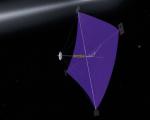 Solar Sail
Solar Sail
7.03.2003
Nearly 400 years ago astronomer Johannes Kepler observed comet tails blown by a solar breeze and suggested that vessels might likewise navigate through space using appropriately fashioned sails. It is now widely recognized that...
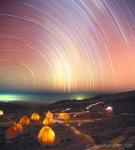 The Star Trails of Kilimanjaro
The Star Trails of Kilimanjaro
6.03.2003
The night had no moon, but the stars were out. And camped at 16,000 feet on Mt. Kilimanjaro, photographer Dan Heller recorded this marvelous 3 1/2 hour long exposure. Here the landscape is lit mostly by the stars.
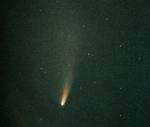 Comet NEAT in Southern Skies
Comet NEAT in Southern Skies
5.03.2003
After last month's dramatic swoop past the Sun, Comet NEAT (C/2002 V1) appeared as a naked-eye comet, emerging from the evening twilight in planet Earth's southern skies. On March 1st, New Zealand...
 Where People Live on Planet Earth
Where People Live on Planet Earth
4.03.2003
Where do people live on Planet Earth? Although people inhabit every continent, the highest population densities occur in Asia. Sparsely inhabited regions occur on virtually every continent, however, including the Sahara Desert in Africa...
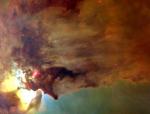 In the Center of the Lagoon Nebula
In the Center of the Lagoon Nebula
3.03.2003
The center of the Lagoon Nebula is busy with the awesome spectacle of star formation. Visible in the lower left, at least two long funnel-shaped clouds, each roughly half a light-year long, have been formed by extreme stellar winds and intense energetic starlight. The tremendously bright nearby star, Hershel 36, lights the area.
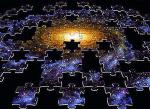 Will the Universe End in a Big Rip
Will the Universe End in a Big Rip
2.03.2003
How will our universe end? Recent speculation now includes a pervasive growing field of mysterious repulsive energy that rips virtually everything apart. Although the universe started with a Big Bang, analysis of recent cosmological measurements allows a possibility that it will end with a Big Rip.
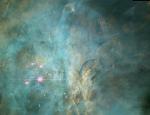 In the Center of the Trapezium
In the Center of the Trapezium
1.03.2003
Start with the constellation of Orion. Near Orion's belt is a fuzzy area known as the Great Nebula of Orion or M42. In this nebula is a bright star cluster known as the Trapezium, shown above. New stellar systems are forming there in gigantic globs of gas and dust known as Proplyds.
|
January February March April May June July August September October November December |
|||||||||||||||||||||||||||||||||||||||||||||||||